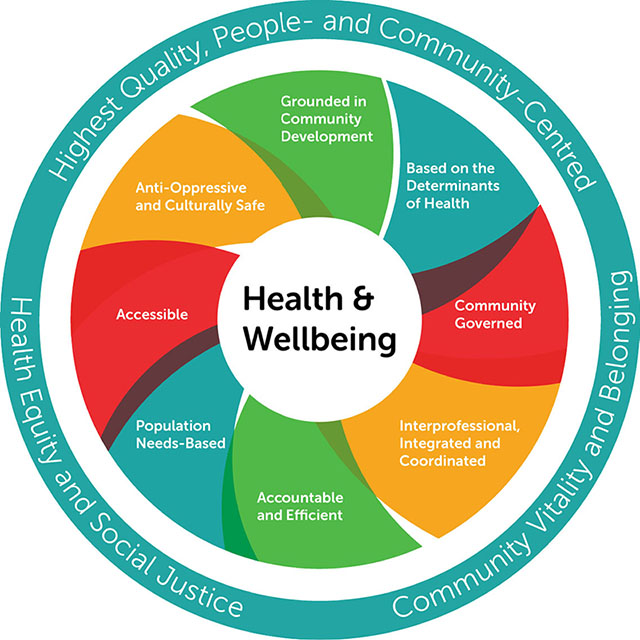CHC Model of Health and Wellbeing
Rideau Community Health Services (RCHS) is committed to the Model of Health and Wellbeing (MHWB) to guide the delivery of primary health care and is committed to service that is:
- Anti-oppressive and culturally safe
- Accessible
- Inter-professional, integrated and coordinated
- Community-governed
- Based on the social determinants of health
- Grounded in a community development approach
- Population and needs-based
- Accountable and efficient

The Highest Quality, People- and Community-Centred Primary Health Care We commit to continuous improvement in the quality of services and programs with all efforts oriented to meet the specific needs of the people and communities being served.
Health Equity and Social Justice We design services and programs to reduce health disparities and inequities. We also advocate for healthier public policy and against unfair practices and prejudices that harm people’s health.
Community Vitality and Belonging We partner with community members to build safe and caring communities where everyone is valued and feels like they belong.
Population Needs-Based Planning We strive to improve the health and wellbeing of the entire population in their catchment area. We asses the needs of different demographic groups and develop action plans to address them.
A Community Development Approach We work with community members to develop solutions that support healthy living. For example: community gardens, affordable housing projects, and civic engagement campaigns enable community members to actively participate in public policy decision making.
A Strong Focus on the Determinants of Health We mitigate the impact of the many non-medical determinants of health. For example, to serve people facing socio-economic challenges, we provide additional supports: transit tickets to get to health appointments, counselling on how to secure employment or access to additional social services and peer support groups. We also advocate for healthier public policies that enable people to access a healthy environment and afford other basic necessities of life.
Interprofessional, Integrated and Coordinated Membership in interprofessional teams extends well beyond clinical providers to include health promoters, social workers, outreach and community development workers. Teams collaborate with a wide range of primary care providers, as well as other parts of the health and social service system.
Anti-oppression and Culturally Safe Practices We recognize many populations face discrimination that harms their health and wellbeing. We ensure our staff receive ongoing training in anti-oppression and culturally safe practices.
Accessibility The priority is providing appropriate access to everyone, no matter who they are or where they live. Accessibility requires breaking down all racial, cultural, linguistic, physical, social, economic, legal and geographic barriers that prevent people from accessing health services.
Community Centredness and Community Governance Based on what we learn through a wide range of engagement processes, we constantly reorient our services to meet communities’ changing needs. Community-centredness is strengthened by another defining feature of the model: community governance. It’s community members who set the strategic direction of our Centre.
Accountability and Efficiency Community governance also ensures we are accountable to our communities and our funders. In addition, we develop and apply reporting indicators so funders can track our performance with respect to effectiveness and efficiency.
For a full description of the Model of Health and Wellbeing, please visit www.allianceon.org/model-health-and-wellbeing
